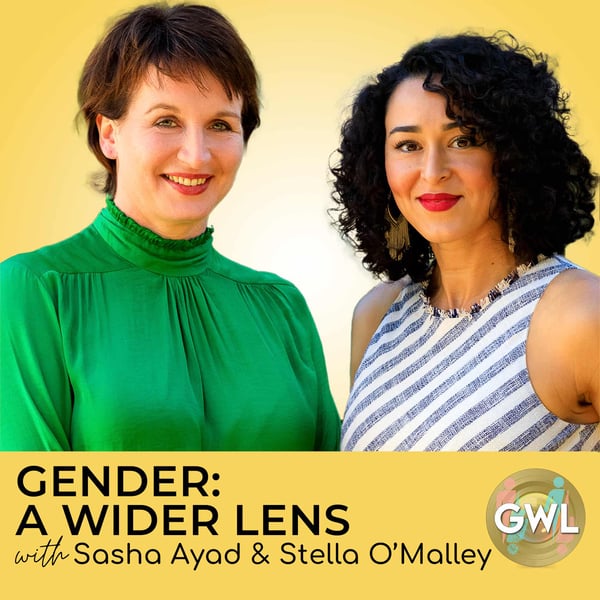Premium: The DSM's Flimsy Criteria for Gender Dysphoria
Gender: A Wider Lens
Sasha Ayad and Stella O'Malley
4.6 • 961 Ratings
🗓️ 1 February 2025
⏱️ 3 minutes
🧾️ Download transcript
Summary
The DSM diagnostic criteria for gender dysphoria are rooted in outdated sex-based stereotypes, reinforcing rigid and superficial notions of what it means to be male or female. These criteria often emphasize preferences in clothing, activities, and playmates, implying that natural variations in a child’s behavior may signal a fundamental misalignment between their gender identity and biological sex.
Historically, gender nonconformity in children was recognized as a common and unremarkable aspect of personality and development. However, cultural shifts and the rise of social media have amplified stereotypes, leading many to pathologize behaviors that once fell within the broad spectrum of normal childhood expression. A boy who enjoys dolls or a girl who prefers rough-and-tumble play is now more likely than ever to be viewed through a diagnostic lens that suggests “misalignment with their sex” rather than an expansion of what it means to be a boy or a girl.
In this bonus episode for premium subscribers, Dr. Marieke den Ouden examines how the DSM’s shift from “sex” to “gender” has introduced diagnostic ambiguity, increasing the risk of over-diagnosing children based on nonconformity to traditional gender roles. Highlighting inconsistencies across international definitions, she warns of the legal and policy ramifications of vague gender identity standards, particularly for women’s rights and medical ethics. She presents a critical yet measured perspective, calling for greater clarity and scientific integrity. She advocates for a re-evaluation of gender dysphoria diagnosis to ensure that criteria are based on objective, measurable factors rather than social perceptions of gender roles, ensuring that medical and psychological interventions serve those in genuine need without unnecessarily pathologizing diverse expressions of personality and identity.
Watch our full length episode with Marieke den Ouden: https://www.widerlenspod.com/p/episode-203
For instructions on setting up a private feed to listen to our premium content in your favorite podcast app, visit https://www.widerlenspod.com/p/how-to-listen-to-our-full-premium.
Transcript
Click on a timestamp to play from that location
| 0:00.0 | Hi, widerlens podcast listener. What you're about to hear is a preview of one of our bonus episodes for premium subscribers. |
| 0:08.0 | If you'd like to hear the rest, head over to widerlenspod.com and sign up for any of our paid membership options. |
| 0:15.0 | Paid subscriptions allow us to continue to create high quality content for our listeners all around the world. |
| 0:20.0 | Now here's the preview of this week's exclusive content. to create high quality content for our listeners all around the world. |
| 0:23.7 | Now here's the preview of this week's exclusive content. |
| 0:31.6 | The thing I'm interested in with the DSM is that like the DSM is, you know, published by the APA in the USA and then the WHO is publishingishing the ICD which is the international classification of diseases |
| 0:39.4 | and it's very similar but it's kind of |
| 0:41.3 | more over in Europe so they've got the ICD |
| 0:43.3 | and got the DSM now |
| 0:45.0 | I find in Ireland we tend to talk |
| 0:47.3 | about the DSM but both |
| 0:49.2 | get brought up and it further |
| 0:51.0 | muddies a very muddied water |
| 0:52.8 | and so the ICD talk about gender incongruence |
| 0:56.3 | just to keep everybody at sea and confused. |
| 0:59.9 | And it feels like the gender does, |
| 1:01.7 | when you look and you, and I have examined the DSM, |
| 1:05.0 | I can see that the DSM is moving kind of relentlessly |
| 1:09.6 | towards gender and congruence. |
| 1:11.4 | And I don't think any of this here would be surprised. |
| 1:14.6 | It's going to become gender in congruence, |
| 1:16.7 | which has nothing to do with distress, |
... |
Please login to see the full transcript.
Disclaimer: The podcast and artwork embedded on this page are from Sasha Ayad and Stella O'Malley, and are the property of its owner and not affiliated with or endorsed by Tapesearch.
Generated transcripts are the property of Sasha Ayad and Stella O'Malley and are distributed freely under the Fair Use doctrine. Transcripts generated by Tapesearch are not guaranteed to be accurate.
Copyright © Tapesearch 2025.

